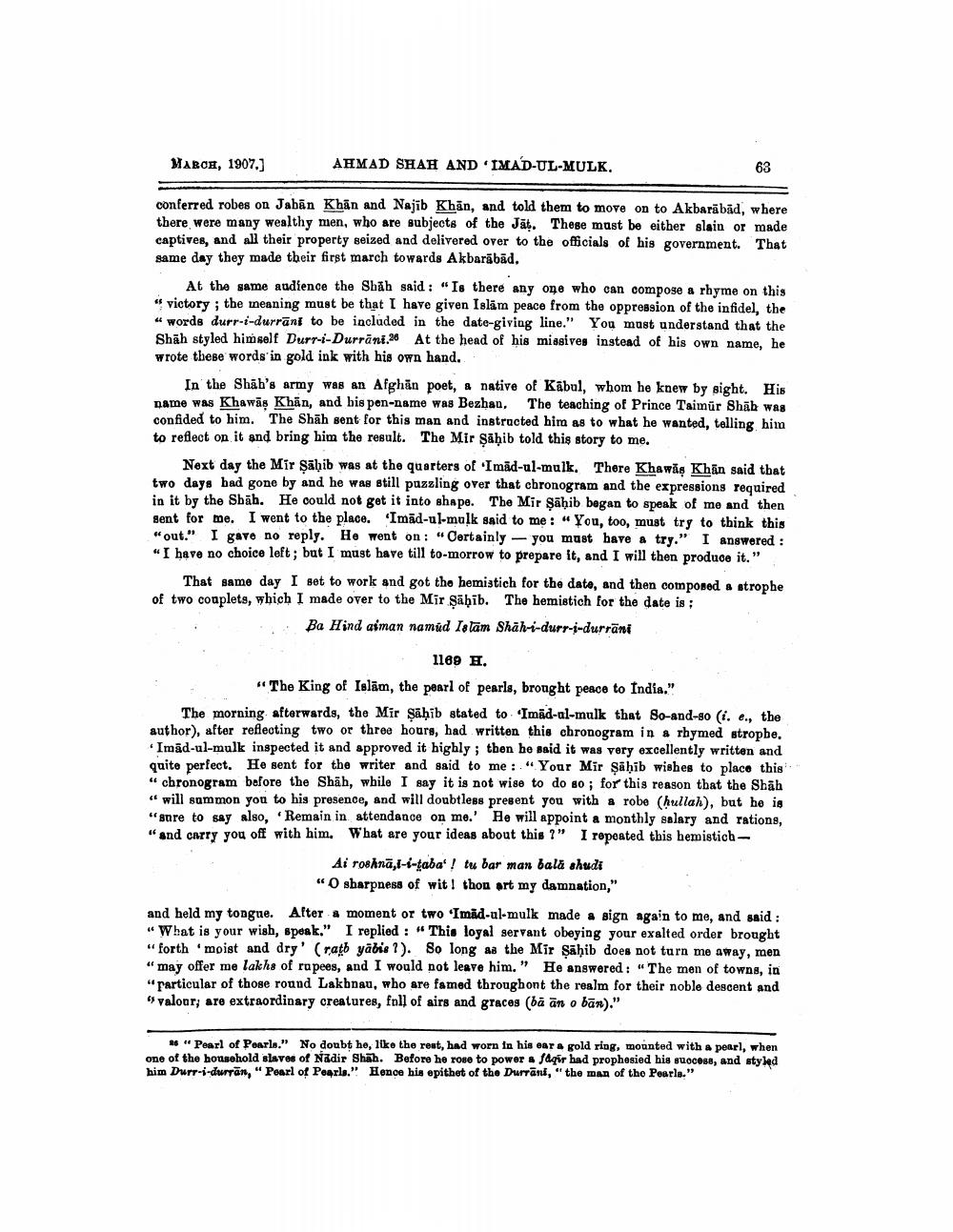________________
MARCH, 1907.)
AHMAD SHAH AND IMAD-UL-MULK.
conferred robes on Jaban Khan and Najib Khān, and told them to move on to Akbarabad, where there were many wealthy men, who are subjects of the Jāt. These must be either slain or made captives, and all their property seized and delivered over to the officials of his government. That same day they made their first march towards Akbarabad.
At the game audience the Shāh said: "Is there any one who can compose a rhyme on this * victory; the meaning must be that I have given Islam peace from the oppression of the infidel, the " words durr-i-durrāni to be included in the date-giving line." You must understand that the Shāh styled himself Durr-i-Durrāni 26 At the head of his missives instead of his own name, he wrote these words in gold ink with his own hand.
In the Shāh's army was an Afghan poet, & native of Kabul, whom he knew by sight. His name was Khawāş Khān, and his pen-name was Bezhan, The teaching of Prince Taimur Shāh was confided to him. The Shāh sent for this man and instructed him as to what he wanted, telling him to reflect on it and bring him the result. The Mir şāḥib told this story to me.
Next day the Mir Sahib was at the quarters of Imád-ul-mulk. There Khawi, Khin said that two days bad gone by and he was still puzzling over that chronogram and the expressions required in it by the Sbäh. He could not get it into shape. The Mir Şahib began to speak of me and then Sent for me. I went to the place. Imād-ul-mulk said to me: "You, too, must try to think this "out." I gavo no reply. He went on : "Certainly - you must bave a try." I answered : "I have no choice left; but I must have till to-morrow to prepare it, and I will then produce it.”
That same day I set to work and got the hemistich for the date, and then componed a strophe of two couplets, which I made over to the Mir şāḥib. The hemistich for the date is :
Ba Hind aiman namud Istām Shah-i-durr-i-durrāni
1189 H. "The King of Islām, the pearl of pearls, brought peace to India." The morning afterwards, the Mir Şahib stated to 'Imād-al-mulk that 80-and-go (i. e., the author), after reflecting two or three hours, had written this chronogram in a rhymed stropbe. • Imād-ul-mulk inspected it and approved it highly; then he said it was very excellently written and quite perfect. Ho sent for the writer and said to me: "Your Mir Şahib wishes to place this « chronogram before the Shāh, while I say it is not wise to do so ; for this reason that the Shah " will summon you to his presence, and will doubtless present you with a robe (hullah), but he is "gure to say also, Remain in attendance on me.' He will appoint a monthly salary and rations, " and carry you off with him. What are your ideas about this ?" I repeated this hemistich
Ai rosinā,l-i-taba'! tu bar man bala shudi “O sharpness of wit I thou art my damnation,"
and held my tongue. After a moment or two 'Imad-ul-mulk made a sign again to me, and said: "What is your wish, speak." I replied: "This loyal servant obeying your exalted order brought " forth moist and dry' (rath yābis ?). So long as the Mir Sahib does not turn me away, men "may offer me lakhs of rupees, and I would not leave him." He answered: "The men of towns, in "particular of those round Lakbnau, who are famed throughont the realm for their noble descent and "valour, are extraordinary creatures, full of airs and graces (bå än o bān)."
15 "Pearl of Poarlo." No doubt he, like the rest, had worn in his eara gold ring, mounted with a pearl, when one of the household slaves of Nadir Shah. Before he rose to power a fagir had prophesied his succoss, and styled him Durr-i-durran, Pearl of Pearls." Hence his epithet of the Durrant, "the man of the Pearlo."




